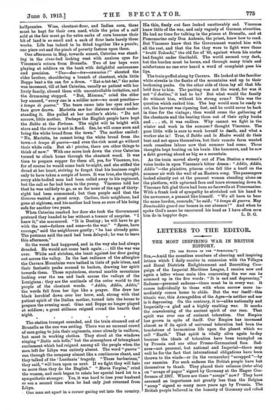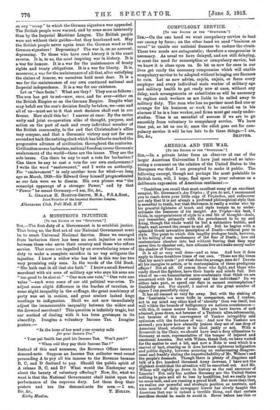LETTERS TO THE EDITOR.
THE MOST INSPIRING WAR IN BRITISH HISTORY.
[To S. EDITOR Or San SPROSSSOa...] $111,—Amid the countless numbers of cheering and inspiring letters which I daily receive in connexion with the Villages and Rural Districts Enlightenment and Recruiting Cam- paign of the Imperial Maritime League, I receive now and again a letter whose main idea concerning the war can be summed up in the five words "It is sad and depressing." Sadness—personal sadness—there must be in every war. It comes individually to those with whom sorrow more im- mediately comes home to abide. But the war itself—this titanic war, this Armageddon of the Agee—is neither sad nor is it depressing. On the contrary, it is—alike nationally and Imperially—a glad and a highly exalting war. It marks tho reawakening of the ancient spirit of our race. That spirit was ever one of eminent toleration. Our Empire has grown in spite of itself. Our Empire has increased almost as if its spirit of universal toleration had been the touchstone of harmonious life upon the planet which we call "Earth." That spirit is vitally alive again to-day because the ideals of toleration have been trampled on by Prussia and our other Pres:so-Germanized foes. Sad- ness—not personal, but national and Imperial—there may well be for the fact that international obligations have been thrown to the winds—or (in the vernacular) "scrapped "—by our enemies. For such eadneas the British people have but themselves to thank. They placed their reliance (inter cilia) on "scraps of paper" signed by Germany at the Hague Con- ference of 1907. Where are these " scraps " now? They have assumed an importance not greatly less than the Belgian "scrap" signed so many more years ago by Prussia. The British people believed in the honesty of Germany and relied on any "scrap" to which the German signature was appended. The British people were warned, and by none more insistently than by the Imperial Maritime League, The British people were not without their guides—but they hearkened not. May the British people never again trust the German word or the German signature! Depressing ? The war is, on no account, depressing. To those who have read history it is the exact reverse. It is, to us, the most inspiring war in history. It is a war for honour. It is a war for the maintenance of treaty rights and treaty obligations. It is a war for liberty. It is, moreover, a war for the maintenance of all that, after satisfying the claims of honour, we ourselves hold most dear. It is a war for the maintenance of our own continued national and Imperial independence. It is a war for our existence.
Let us "face facts." What are they P They are as follows The sun has got to set—now, once, and for ever—either on the British Empire or on the German Empire. Despite what may befall ere the sun's decision finally be taken, we—one and all of us—must see to it that such decision shall rest in our favour. How shall this be ! I answer at once: By the entire unity and joint co-operation alike of thought, purpose, and action on the part of each and every individual member of the British community, to the end that Christendom's allies may conquer, and that a Germanic victory may not for one second set back thenntiring clock which has 'hitherto marked the progressive advance of civilization throughout the centuries. Civilization remits barbarism, national freedom versus Germanic enslavement of the world—these are the issues. They are the sole issues. Can there be any to cast a vote for barbarism ? Can there be any to cast a vote for our own enslavement P I write the word "enslavement," and I write on authority. For "enslavement" is only another term for what—so long ago as March, 1909—Sir Edward Grey himself prognosticated as our fate were we to disarm. His own phrase was " the conscript appanage of a stronger Power," and by that "Power" he meant Germany.-1 am, Sir, Sur., L. Gasmax H. Howros-Sturn, MA., F.S.A.Scot, Joint-rounder of the Imperial Identime League, Athenaeum. Club, Pall Mall, B.W.



































 Previous page
Previous page